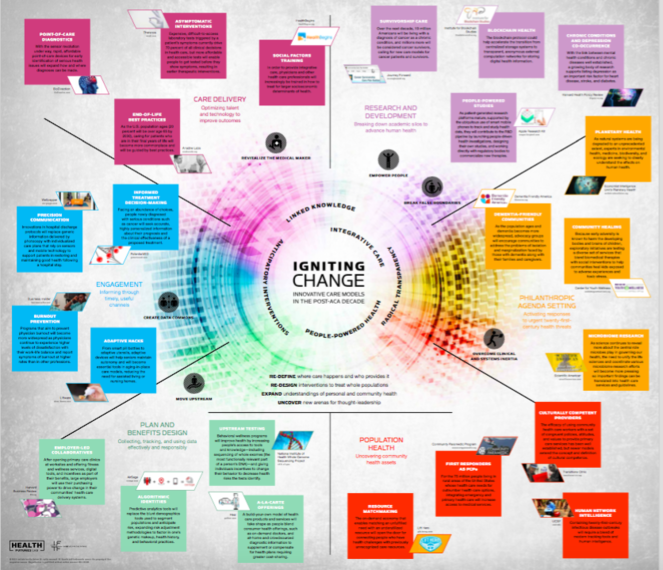Future Now
The IFTF Blog
Igniting Leadership in the Post-ACA Decade
Almost 7 years after the Affordable Care Act (ACA) was signed and 5 years since it was upheld in the Supreme Court, leadership, foresight, and creativity in health care is needed more than ever. And while the Health Futures Lab always planned to publicly release the 2015 research on the post-ACA decade this month, the imminent changes facing the Affordable Care Act make releasing this research now particularly germane. This is because a key finding in Igniting Change: Innovative Care Models in the Post-ACA Decade is that the ACA catalyzed a new innovation landscape in health care because it unified and amplified other forces that had been reshaping health and health care for years.
So, irrespective of any alterations that will be made to the federal statute over the next few years, these catalyzing forces—integrative care, people-powered health, anticipatory interventions, radical transparency, and linked knowledge—will continue to chip away at legacy delivery systems and outdated care and research models. They will continue to create the conditions that will catalyze experimentation, creativity, and radical reinvention of care models in the next decade.
Our foresight map, Igniting Change: Innovative Care Models in the Post-ACA Decade, identifies emerging care models, the forces making them possible, and the kinds of leadership skills you’ll need to effectively navigate the next decade. Specifically, it maps 24 innovative models across six target areas in health that are primed for reinvention: care delivery, plan & benefits, R&D, population health, engagement and philanthropic agenda-setting. Taken together, the innovative models reveal four key directional changes:
- A redefinition of where care will happen and who or what will provide it;
- A re-design of interventions to treat whole populations;
- Expanding understandings of how to produce personal and community health; and
- New arenas for thought-leadership in philanthropy and global health opening up over the next decade.
For these models to ignite lasting and sustaining change, however, they require strong leadership. Igniting Change: Innovative Care Models in the Post-ACA Decade is also a call to action for leaders to:
1. Empower people. The narrative behind consumerism in health places significant demands on individuals to do more to finance and take care of their own health. Leaders must help empower people with the right tools and support to make better decisions for their own health and well-being.
2. Break false boundaries. To achieve optimal health outcomes, leaders need to erase legacy boundaries that are no longer useful. Whether these boundaries separate mental health from physical health or the patient from the person, breaking them will enable resources and expertise to flow effectively and propel new care models to flourish.
3. Swim Upstream. Transformative research continues to suggest that early and holistic interventions result in the most optimal health outcomes. As we gradually move away from a fee-for-service model of care delivery, leaders must look for opportunities to leverage the most promising set of resources to anticipate and deliver person-centered care.
4. Create data commons. The next decade is the opportunity for health care to lead in using diverse data to personalize medicine and deliver smart population health management. Without strong leadership, however, health care will fall dramatically behind other industries. Leaders must do more than be open to sharing data; they must co-create it.
5. Revitalize the medical maker. Nurses and other allied health workers and caregivers are the under-recognized innovators in health care. Leaders need to embrace and empower the creativity and ingenuity of frontline workers, home health workers, and those implementing workarounds in under-resourced facilities, because they are the inventors at the forefront of the next generation of care.
6. Fight clinical and systems inertia. Dr. Edward Wagner, who developed the model for chronic disease coordination, warns against clinical inertia or the tendency to maintain current treatment strategies despite poor outcomes. In addition, leaders must overcome systems inertia—the tendency to resist change at the systems level. By fighting health care systems’ reluctance to change, leaders can become the “impatient activists” needed to transform health care.
To learn more about leadership strategies for the post-ACA world, click on this link to read the map.
The ACA served as a spark to ignite systems-level change in health, through providing the policy and funding push needed. Repealing it won’t quell the drive toward sustainable, effective, and systematic change for outcomes, quality, and affordability in US health care. The experimentation, innovation, and radical reinvention of care models that have emerged will continue long into the next decade. And the tensions that will arise as changes are proposed and enacted to the statute will bring additional value to foresight, as leaders work to design resilient and adaptable pathways forward. Prepare for exciting and turbulent times by learning about highly innovative care models emerging in the post-ACA decade.
For more information about this research or the Health Futures Lab 2017 research agenda, please contact: John Clamme | jclamme@iftf.org | 650-233-9517




